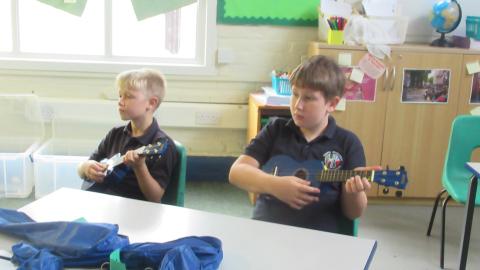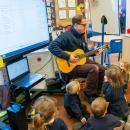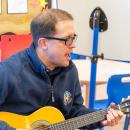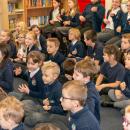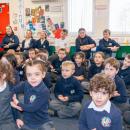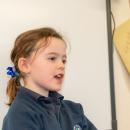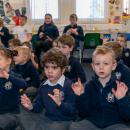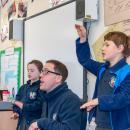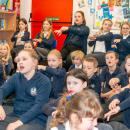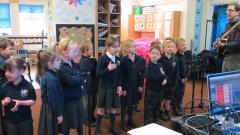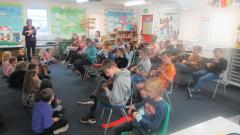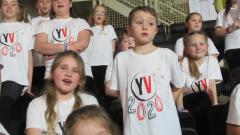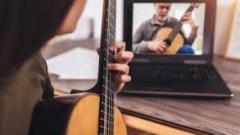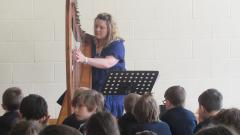‘Music is life. That’s why our hearts have beats.’
Cecily Morgan
Music is a universal language that embodies one of the highest forms of creativity. We provide opportunities for all children to create, play, perform and enjoy music, to develop the skills to appreciate a wide variety of musical forms, and to begin to make judgements about the quality of music.
The aims of music teaching are to enable all children to:
• perform, listen to, review and evaluate music across a range of historical periods, genres,
styles and traditions, including the works of the great composers and musicians
• learn to sing and use their voices
• have the opportunity to learn to play a musical instrument
• use technology appropriately to create and compose music on their own and with others
• understand and explore how music is created.
Our music curriculum is rooted in the ‘Sing Up’ scheme. We aim for every child to have access to high-quality, practical, and engaging musical experiences through our pupil and teacher resources.
We want all children to develop the self-confidence, skills, knowledge, and understanding to develop a lifelong love of music, whilst also providing a secure foundation that enables them to take music further should they wish to.
We also want teachers to enjoy teaching music and to feel empowered, armed with good subject knowledge and practical music-making activity, and confident that the scheme they are teaching will work brilliantly with the children in front of them.
We aim to make music an enjoyable learning experience and encourage children to participate in a variety of musical activities. We provide opportunities for all children to sing and to listen to and appreciate different styles and genres of music. We teach them the skills of recognising and commenting on pulse, pitch, rhythm, timbre, dynamics and texture in music. We provide opportunities for children to work with others to make music and show how individuals compose and organise music. We also begin to teach them some of the features of musical notation and to develop an understanding of the history of music.
Curriculum progression
The majority of music is taught discretely using the ‘Sing Up’ school programme and is delivered primarily by a specialist music teacher. The ‘Sing Up’ scheme demonstrates clear progression and weaves inter-related dimensions of music through the units to encourage the development of musical skills as the learning progresses through listening and appraising, differing musical activities (including creating and exploring) and performing.
Each unit of work comprises of strands of musical learning which correspond with the national curriculum for music:
· Listening and Appraising
· Singing
· Playing instruments
· Improvisation
· Composition
· Performing
Additional music teaching
Children are offered the opportunity to learn to play an instrument with two peripatetic music teachers from North Yorkshire Council who offer tuition in piano, guitar and drums. Children in KS2 are also taught the ukulele where they learn to play a variety of pieces as a whole class over a full term per year.
Music Mark School
As a Music Mark School we are committed to providing a high-quality music education for our school community. Music Mark Schools have access to Music Mark resources, receive certification and can network with the wider Music Education sector.Music curriculum planning
‘Sing Up Music’ is designed and written by subject specialists. It sets out the skills, knowledge, and understanding to be gained by all pupils at each stage of learning, including the Early Years Foundation Stage. Together, the 80+ units (from Nursery to Year 6) represent a complete and progressive library of resources that meets the requirements of the National Curriculum for Music, the suggested approaches of the Model Music Curriculum, as well as the Statutory Framework for Early Years Foundation Stage and Music Development Matters.
The collecting of evidence to demonstrate pupil progress is written into each year group’s units of work – a ‘Progression snapshot activity’ - as part of a unit at three points during the year – September, February, and June. The activity involves the collecting of video evidence to pass on to the Music Lead.
In addition to the Sing Up scheme, music is also taught and used across the curriculum as an enhancement within projects. To ensure progression, procedural knowledge is mapped across school using a SOLO taxonomy model, and a wide range of resources are available to support music teaching
Sing Up Music resources
Curriculum planning materials including:
o Sing Up Music - A music curriculum for ages 3 - 11 – A guide to implementing Sing Up Music.
o Curriculum mapping overview: a list of all unit titles and the musical focus for activity, mapped against the Statutory Framework for the Early Years Foundation Stage (Expressive Arts), National Curriculum for Music, and Model Music Curriculum.
o One-year programme by year group: a list of each unit’s musical focus and learning outcomes (Nursery to Year 6).
o Two-year programme for mixed-age teaching: a list of each unit’s musical focus and learning outcomes (EYFS, KS1, Lower KS2, Upper KS2).
Lesson delivery resources:
o Unit overview and lesson planning documents.
o Lesson-by-lesson printable webpages and classroom facing editable PowerPoints.
o Structured activity guidance with timings.
o Access to songs, scores, audio tracks via the interactive whiteboard.
o Pupil teaching videos.
o Downloadable PDFs (e.g. posters, worksheets, lesson resources etc.).
o Links to free external resources to support and complement classroom activity.
Assessment and progression
Children’s learning in music is assessed formatively by observing and making informal judgements throughout units of work. Additional evidence may be:
o Unit and lesson-by-lesson learning outcomes to inform teaching.
o In-built ‘progression snapshot’ activity and video evidence collection as recommended by Ofsted.
o Progression overview: an at-a-glance grid of learning outcomes for Improvising and Composing, Singing and Playing, Listening and Appraising for Year 1 to Year 6.
Pupil resources
o Demonstration and teaching videos allowing you to bring experts into your classroom and learn alongside the children.
o Pupil access to a secure student area where teachers can set activity and link to resources from the Sing Up website (and external resource), helping children to independently develop their musical learning.
Downloadable PDFs
Continuing professional development resources, aiding, and supporting teachers to teach music effectively and to ensure a sustainable music teaching workforce, providing the best possible outcomes for children and young people.
o Expert practice videos and audio clips for demonstration.
o A ‘Developing Musicianship Toolkit’ includes descriptions, video demonstrations, and guidance for teachers on teaching the fundamental elements of music: beat, rhythm, and pitch.

